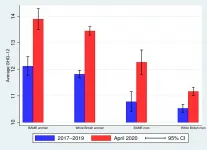(Press-News.org) Researchers at Rush University Medical Center have found that opioid use might increase a person's risk of developing pancreatic cancer.
Published Jan. 6, the study, titled "Opioid Use as a Potential Risk Factor for Pancreatic Cancer in the United States," is the first in the country to show evidence that opioid use may be an unidentified risk factor contributing to the increasing incidence of pancreatic cancer.
In fact, opioid misuse and overdose have evolved into a public health crisis. Approximately 70,000 drug overdose deaths were reported in 2017, 68% of which involved an opioid.¹ The use of prescription opioids for the management of chronic pain has increased remarkably, with more than 191 million opioid prescriptions given to patients in the United States in 2017. Not surprisingly, the opioid addiction rates among patients who are given opioid for chronic pain have increased, with 29% of such patients misusing opioids, and 12% developing an opioid use disorder.²
Pancreatic cancer rates also are increasing in the United States. Opioids have been shown to have a harmful effect on multiple types of cancer with recent data suggesting opium use as a possible risk factor for pancreatic cancer in West Central Asia. Population-based studies have suggested opium use to increase risk of pancreatic cancer in a dose dependent manner.³?? While opium use is not a common recreational habit in the United States, opioid use has been rising remarkably over the past decade.
Faraz Bishehsari, MD, PhD, the corresponding author of the study, and his team aimed to examine the possible association between the pattern of opioid use and the changes in the rates of pancreatic cancer during the years 1999-2016. Using the Center for Disease Control's Wonder online data (procured from the Vital Statistics Cooperative Program) the team extracted the opioid death rate as a surrogate for prescription and illicit opioid use. Incidence of pancreatic cancer was retrieved from the CDC's online database gathered from the U.S. Cancer Statistics Working Group. They extracted the pattern of the lifestyle and behavioral factors that over time could potentially affect the risk of pancreatic cancer.
Usman Barlass, MD, Ameya Deshmukh, PhD, and Todd Beck, MD, worked with Bishehsari on the study. Using national datasets, the team evaluated whether the trend in opioid usage could explain increasing pancreatic cancer diagnoses at the national and state levels over time after correcting for the potential confounding factors. They found that both pancreatic cancer and opioid death rates rose over time at the national and state levels. A prior state's opioid death rate significantly predicted the trend in the incidence of pancreatic cancer years after and had a significant effect on the estimated annual change in the rate of this cancer.
The collected data suggests a link between opioid consumption and the risk of pancreatic cancer. The next step to directly establish the role of opioids as a novel risk factor for pancreatic cancer is to conduct large population-based studies or longitudinal datasets that reliably register long-term outcomes in opioid users. Findings from the current study, once confirmed by the individual-level data on opioid consumption and risk of pancreatic cancer, could have direct clinical relevance by considering non-narcotic (alternative) pain control approaches in these patients.
The team proposes to investigate possible mechanisms that may link opioid use to the development and/or progression of pancreatic cancer. Consistent with the current findings, a recent post hoc analysis of two randomized controlled trials of patients with advanced cancers (including pancreatic cancer), revealed that that those treated frequently with an opioid antagonist had significantly improved overall survival compared to placebo.?
"Our mechanistic studies could provide further insights on the pathways that opioid could potentially impact progression of cancer," Bishehsari added.
INFORMATION:
Citations
1. L. Scholl, P. Seth, M. Kariisa, N. Wilson, G. Baldwin, Drug and Opioid-Involved Overdose Deaths - United States, 2013-2017, MMWR Morb Mortal Wkly Rep, 67 (2018) 1419-1427.
2. K.E. Vowles, M.L. McEntee, P.S. Julnes, T. Frohe, J.P. Ney, D.N. van der Goes, Rates of opioid misuse, abuse, and addiction in chronic pain: a systematic review and data synthesis, Pain, 156 (2015) 569-576.
3. S. Moossavi, M. Mohamadnejad, A. Pourshams, H. Poustchi, F. Islami, M. Sharafkhah, B. Mirminachi, S. Nasseri-Moghaddam, S. Semnani, R. Shakeri, A. Etemadi, S. Merat, M. Khoshnia, S.M. Dawsey, P.D. Pharoah, P. Brennan, C.C. Abnet, P. Boffetta, F. Kamangar, R. Malekzadeh, Opium Use and Risk of Pancreatic Cancer: A Prospective Cohort Study, Cancer Epidemiol Biomarkers Prev, 27 (2018) 268-273.
4. R. Shakeri, F. Kamangar, M. Mohamadnejad, R. Tabrizi, F. Zamani, A. Mohamadkhani, S. Nikfam, A. Nikmanesh, M. Sotoudeh, R. Sotoudehmanesh, B. Shahbazkhani, M.R. Ostovaneh, F. Islami, H. Poustchi, P. Boffetta, R. Malekzadeh, A. Pourshams, Opium use, cigarette smoking, and alcohol consumption in relation to pancreatic cancer, Medicine (Baltimore), 95 (2016) e3922.
5. F. Janku, L.K. Johnson, D.D. Karp, J.T. Atkins, P.A. Singleton, J. Moss, Treatment with methylnaltrexone is associated with increased survival in patients with advanced cancer, Ann Oncol, 27 (2016) 2032-2038.
Study Link: https://journals.plos.org/plosone/article?id=10.1371/journal.pone.0244285
DURHAM, N.C. -- Before the pandemic, one-third of U.S. households with children were already "net worth poor," lacking enough financial resources to sustain their families for three months at a poverty level, finds new research from Duke University.
In 2019, 57 percent of Black families and 50 percent of Latino families with children were poor in terms of net worth. By comparison, the rate for white families was 24 percent.
"These 'net worth poor' households have no assets to withstand a sudden economic loss, like we have seen with COVID-19," said Christina Gibson-Davis, co-author of the study and professor of public policy and sociology at Duke University's Center for Child and Family Policy. "Their ...
Related to new research published in the January issue of Science Translational Medicine, Patrick McNutt, PhD, of the Wake Forest Institute for Regenerative Medicine, was part of the research team that demonstrated a new "Trojan horse" approach that produces strong antidotal efficacy in treating lethal botulism in mice, guinea pigs and rhesus macaque monkeys.
Furthermore, in a companion article, an independent team demonstrated that a related drug has robust efficacy in mice.
"This is one of those serendipitous moments in science where two groups, working independently, demonstrate similar results for a long-standing ...
Investing in biotech companies may not entail higher risk than investing in other sectors, according to a new report from Bentley University's Center for Integration of Science and Industry. A large scale study of biotechnology companies that completed Initial Public Offerings (IPOs) from 1997-2016 demonstrates that these companies produced more than $100 billion in shareholder value and almost $100 billion in new value creation despite a failure rate greater than 50%. The study compared the financial performance and economic value created by these biotech companies to non-biotechnology controls that had similarly timed IPOs.
The findings are published in PLOS ONE in the article "Comparing long-term value creation after biotech and non-biotech ...
Our reluctance to think, talk or communicate about death is even more pronounced when we deal with others' loss compared to our own, new research finds, but either way we tend to frame attitudes and emotions in a sad and negative way.
Teaching new more positive ways to address these difficult conversations is the focus of a new paper in PLOS ONE journal by palliative care specialists across Australia.
Led by Flinders University's Research Centre for Palliative Care, Death and Dying (RePaDD) and Palliative and Supportive Services, researchers from Flinders, CQUniversity Australia, NT Palliative Care Central Australia and University of Technology Sydney, surveyed 1,491 people about ...
Photosynthetic organisms tap light for fuel, but sometimes there's too much of a good thing.
New research from Washington University in St. Louis reveals the core structure of the light-harvesting antenna of cyanobacteria or blue-green algae -- including key features that both collect energy and block excess light absorption. The study, published Jan. 6 in Science Advances, yields insights relevant to future energy applications.
Scientists built a model of the large protein complex called phycobilisome that collects and transmits light energy. Phycobilisomes allow cyanobacteria to take advantage of different wavelengths of light than other photosynthetic ...
An analysis of 145 scholarly journals found that, among various factors that could contribute to gender bias and lesser representation of women in science, the peer review process itself is unlikely to be the primary cause of publishing inequalities. However, Flaminio Squazzoni and colleagues emphasize that the study does not account for many other factors that may affect women's representation in academia, including educational stereotypes and academic choices of priorities and specialties. Even as female representation has improved in fields such as the humanities, psychology, and the social sciences, a publication gap persists, with male authors continuing to publish more manuscripts in more prestigious journals. To better understand whether ...
Step into your new, microscopic time machine. Scientists at the University of Colorado Boulder have discovered that a type of single-celled organism living in modern-day oceans may have a lot in common with life forms that existed billions of years ago--and that fundamentally transformed the planet.
The new research, which will appear Jan. 6 in the journal Science Advances, is the latest to probe the lives of what may be nature's hardest working microbes: cyanobacteria.
These single-celled, photosynthetic organisms, also known as "blue-green algae," can be found in almost any large body of water today. But more than 2 billion years ago, they took on an extra important role in the history of life on ...
In the UK, men from ethnic minorities and women may have experienced worse mental health declines than White British men, according to a study published January 6, 2021 in the open access journal PLOS ONE by Eugenio Proto and Climent Quintana-Domeque of institutions including the University of Glasgow and the University of Exeter, UK.
The COVID-19 pandemic, and the measures enacted to restrict the spread of the virus, have had a major impact on the lives of citizens globally. The authors of the present study examined changes in mental health associated with the pandemic across ethnic groups in the UK.
The researchers used data from the UK Household Longitudinal Study, comparing responses from participants between 2017 and 2019 (i.e.: prior to the pandemic) to responses from ...
CAR T cells are a breakthrough class of effective but often toxic cancer therapies
To prevent overactivation, switchable CAR T cells were engineered that can be turned on and off with an approved, widely used cancer drug
BOSTON - Scientists at Dana-Farber Cancer Institute and Mass General Cancer Center have created molecular ON-OFF switches to regulate the activity of CAR T cells, a potent form of cell-based immunotherapy that has had dramatic success in treating some advanced cancers, but which pose a significant risk of toxic side effects.
CAR T cells are immune cells genetically modified to recognize and attack tumors ...
The distribution and concentration of dissolved oxygen and water temperature in the oceans and freshwaters are usually far more influential in shaping the growth and reproduction of fish than the distribution of their prey.
In a new paper in Science Advances, Daniel Pauly, principal investigator of the Sea Around Us initiative at UBC's Institute for the Oceans and Fisheries, argues that scientists need to avoid attaching human attributes to fish and start looking at their unique biology and constraints through a different lens.
This lens is Pauly's own Gill Oxygen Limitation Theory (GOLT), ...



